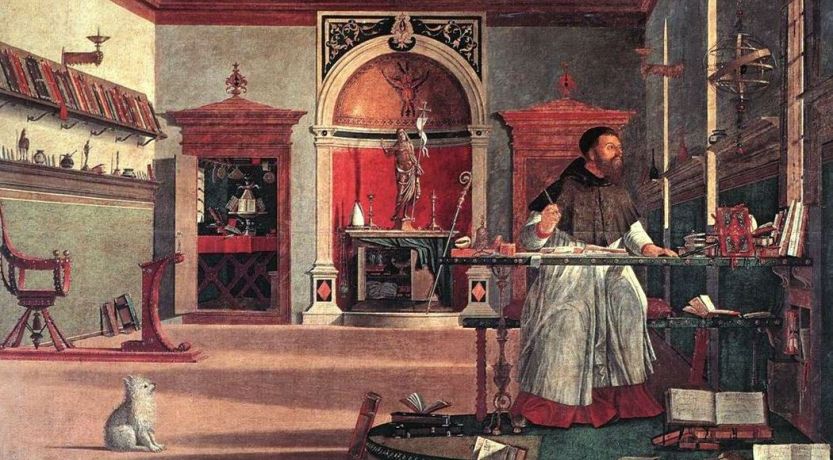Augustine is known as one of the “fathers” of Christianity. However, he had his own ideas, and he promoted major changes to doctrines taught by Christ and His apostles.

St. Augustine in His Study by Vittore Carpaccio, 1502.
“The theological position and influence of Augustine may be said to be unrivalled. No single name has ever exercised such power over the Christian Church, and no one mind ever made so deep an impression upon Christian thought. … The judgment of Catholics still proclaims the ideas of Augustine as the only sound basis of philosophy” (Encyclopaedia Britannica, 1911 edition, “Saint Augustine”).
In both his philosophical and theological reasoning, Augustine (A.D. 354-430) was greatly influenced by Stoicism, Platonism and Neoplatonism. This means that Augustine was greatly influenced by the Greek philosophers and brought those pagan philosophical ideas into the Roman Church. And those concepts became dominant rather than the teachings of Jesus Christ and the apostles.
Augustine’s life
As a youth, Augustine lived a hedonistic lifestyle for a time. In Carthage he developed a relationship with a young woman who would be his concubine for over 15 years, and by whom he had a son. Sometime later in Milan Augustine’s mother coerced her son to abandon his concubine and arranged a society marriage. (However, he had to wait two years until his fiancée came of age, and during that time he had a sexual relationship with another woman.)
In the summer of 386, Augustine decided to convert to Christianity—yet he still believed in Neoplatonism (a philosophical belief system originated in the third century by Plotinus, who founded it chiefly on Platonic teaching and Eastern mysticism). He also abandoned his teaching position in Milan and gave up any ideas of marriage. He then devoted himself entirely to the Catholic priesthood and celibacy.
It was during this time that he concluded that sex was evil. In his autobiographical Confessions, he described his sexual impulses using language with negative images of disease, disorder and corruption. He compared sexual desire to mud, a whirlpool, chains, thorns and a seething cauldron. He didn’t understand that sex is a gift from God to be used exclusively in marriage.
Augustine’s impact
Augustine had a great influence on the Roman Church’s doctrine of marriage and sex.
As Herbert Armstrong wrote in his book The Missing Dimension in Sex, “Augustine’s conscience was wracked with guilt over his fornication and sex vices. He never married. He largely influenced the establishment of priesthood celibacy. He was not without quantitative sex experience. … He never experienced the giving of love in marriage. He knew nothing of its happy and blissful joys. All he knew, by experience, was inordinate, self-desire, followed by the conscience-stricken pangs of self-condemnation and guilt” (1981 edition, p. 110).
Fornication and adultery are sins, but sex in marriage is not a sin, nor is it evil. Yet Augustine promoted the idea that any use of sex, including sex in marriage, was evil, and it was only necessary for procreation.
God, however, has a much greater design for sex, and it is not evil. To see what the Bible really says about sex, read “The Gift of Sex.”
Augustine’s other deceptions
One of the most profound teachings that Augustine promoted was that the Sabbath should be observed on Sunday. “The holy doctors of the church have decreed that all the glory of the Jewish Sabbath is transferred to it [Sunday]. Let us therefore keep the Lord’s Day as the ancients were commanded to do the Sabbath” (quoted by Robert Cox in Sabbath Laws and Sabbath Duties, 1853, p. 284).
God’s law, though, is very clear. The Sabbath is the seventh day, and it was never changed. Man can’t change it to any other day. See our article “When and How Did the Change in Worship From Saturday to Sunday Occur?”
Augustine and prayer
The Bible plainly tells us that when we pray, we are to address our Father in heaven. Yet millions are told to pray to Mary. Where did that come from? You guessed it: Augustine.
In fact, Augustine wrote quite a lot about Mary, and he came up with a prayer that includes the following: “Holy Mary, succor the miserable, help the fainthearted, comfort the sorrowful, pray for thy people, plead for the clergy, intercede for all women consecrated to God; may all who keep thy holy commemoration feel now thy help and protection. Be thou ever ready to assist us when we pray, and bring back to us the answers to our prayers.”
But God is the One who is the defender of the fatherless and the widow (Psalm 68:5), not Mary. God is the One who answers our prayers, not Mary. In fact, according to the teaching of the Bible, Mary can’t be our mediator since she is dead in the grave (John 3:13; Acts 2:34). Jesus is our Intercessor (Romans 8:34), and He told us to pray to the Father (Matthew 6:6, 9).
For more information about praying to Mary, read the article “Should You Pray to Mary?”
Augustine and the Millennium
During the time Augustine lived, he also wrote a book titled The City of God. It is eye-opening, as it reveals how he viewed the Church and the Kingdom of God.
Author John Figgis reviewed Augustine’s book and wrote: “Augustine, it appears to be proved, is the first of the fathers to declare that the Church is the Kingdom of God on earth. The most important of the passages is that in XX. 9. There Augustine is arguing for the identification of the Church with the millennial kingdom (as against the Chiliasts [those who believe in the millennium]) and for the rulers of the Church sitting on thrones” (The Political Aspects of Augustine’s ‘City of God,’ 2010, p. 68).
That is contrary to what Revelation 20:6 tells us: “Blessed and holy is he who has part in the first resurrection. Over such the second death has no power, but they shall be priests of God and of Christ, and shall reign with Him a thousand years.”
This first resurrection occurs at Christ’s second coming, and it will be at that time when the resurrected saints will rule with Him during the Millennium. So, Augustine was wrong. The Millennium cannot be referring to the Catholic Church or to its bishops. For one thing, the Bible says, “Flesh and blood cannot inherit the kingdom of God” (1 Corinthians 15:50). No one in the Catholic Church who lived in the fourth century is still alive and reigning on thrones.
For further information about the Millennium, please see our article “1,000 Years—the Millennium.”
Escape from persecution
The members of the Church of God didn’t accept those beliefs that were being introduced into the Roman Church. And because of persecution over their beliefs—beliefs that they learned from Jesus and the apostles—they had to flee and hide in wilderness areas in order to follow true doctrine.
The members of the Church of God didn’t accept those beliefs that were being introduced into the Roman Church. And because of persecution over their beliefs—beliefs that they learned from Jesus and the apostles—they had to flee and hide in wilderness areas in order to follow true doctrine.
E.H. Broadbent wrote in The Pilgrim Church: “The union of Church and State was in all times looked upon by many of the Lord’s disciples as contrary to His teaching; but whenever the Church had the power of the State at its command, it used it for the forcible suppression of any who dissented from its system or in any way refused compliance with its demands, and great numbers through indifference or interest or fear yielded at least an outward obedience. There were, however, always some who could not be induced to do this, but who still endeavoured to follow Christ and keep the teachings of His Word and the doctrine of the Apostles. These were continually objects of persecution” (2014 edition, pp. 61-62).
Broadbent further discussed this persecution and where the Church of God could be found: “Movements of revival have never ceased to be repeated, and even when no connection between one and another is visible, the underlying cause is the same—a desire to return to the practice of some New Testament truth. In the early centuries Asia Minor and Armenia were frequently the scene of such revivings, as well as being the refuge of churches that had from the first, in varying degree, maintained purity of doctrine and godliness of life” (pp. 62-63).
Broadbent also noted: “They were also called Thonraks, after a place where they were at one time numerous. The persecutions to which they were subjected and the systematic destruction of their literature, hide from us all but occasional glimpses of their history, though what remains is sufficient to show that there were in those wide regions of Asia Minor and Armenia, around Mount Ararat and beyond the Euphrates, churches of baptised believers, disciples of the Lord Jesus Christ, who kept the teaching of the Apostles received from Christ and contained in the Scriptures, in an unbroken testimony from the first” (p. 64).
Of course not every persecuted group that is found in history was part of the true Church. Just like today, when people hear of the Church of God, they ask, “Which one?” Many of these groups meet on Sunday instead of on the seventh day. But, even though it was small and hidden at times, the true Church of God never did die out, just as Christ promised (Matthew 16:18).
Lessons for us
The Bible speaks of a time in the future when a great political and religious duo, called the beast and the false prophet, will come to power and deceive millions. They will blaspheme God (Revelation 13:6-7). We must stand firm to the teaching of Holy Scripture and pray that we are counted worthy to escape this coming tribulation (Luke 21:34-36).
Just as God’s faithful people stayed loyal to the teachings of the Bible in the past, so, too, we need to stay loyal to the truths revealed in God’s Word. So, whether it’s Augustine’s false ideas from the past or false ideas that will come from the beast and false prophet in the future, we all need to stay grounded in the Word of God so that we will not be deceived!
For further reading, see our article “Will You Recognize the Antichrist?”





